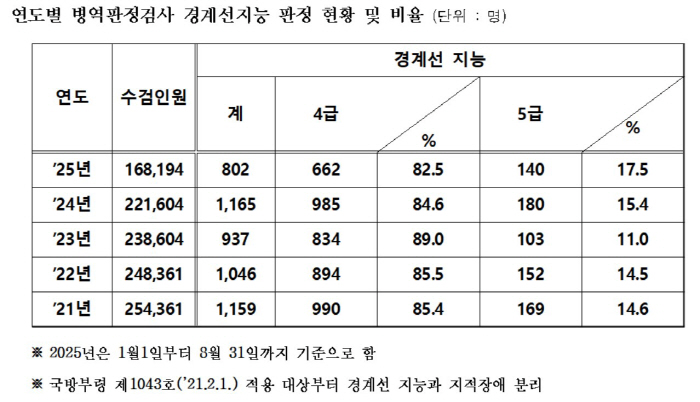About 1,000 people are judged as borderline intelligents every year in the military service examination...Blind spots for education, welfare, and employment due to lack of justice and support system
|
According to data submitted by Seo Mi-hwa (Democratic Party of Korea), a member of the National Assembly's Health and Welfare Committee, about 800 to 1,100 borderline intelligents have been determined every year during the military service examination over the past four years.
According to the data, ▲ 1,159 (0.46%) out of 254,361 in 2021 ▲ 1,046 (0.42%) out of 248,361 in 2022 and 937 (0.39%) out of 238,604 in 2023 ▲ 1,165 (0.53%) out of 221,604 in 2024 ▲ 802 (0.48%) out of a total of 168,194 people from January 1 to August 31, 2025 were counted as borderline intelligence.
On January 7, 1992, the Military Manpower Administration revised the Ministry of National Defense Ordinance No. 468 to establish borderline intelligence evaluation criteria in 'Examination Rules, such as Military Determination Physical Examination'. At that time, the 4th grade (supplementary service) was uniformly determined, but as the system was later supplemented, it is now subdivided into 4th grade (supplementary service), 5th grade (exhibition service), and 7th grade (re-examination) depending on the results of the inspection.
According to the relevant rules, the Military Manpower Administration comprehensively judges standardized intelligence tests (K-WAIS-IV), social adaptability tests (K-Vineland-II), elementary, middle, and high school life records, and psychiatric evaluations.
On the other hand, the Ministry of Health and Welfare has not officially established a clear legal definition or judgment criteria for borderline intelligents. According to the Ministry of Health and Welfare, the number of borderline intelligents among Korea's total population is estimated to be between 5.65 million and 6.67 million. This is equivalent to 1 in 9 people based on the population (about 50.93 million) according to the resident registration demographics in August 2025. However, it is not included in the existing system such as the Welfare of Persons with Disabilities Act, so there is an institutional blind spot in the areas of daily life such as welfare, education, and employment.
Representative Seo Mi-hwa's representative proposal in June on the "Act on Support for Self-reliance and Guarantee of Rights for Borderline Intelligence" stipulates the legal definition of borderline intelligents, and establishes a system of discovery and connection and a customized support system for each life cycle. Currently, the bill is pending before the National Assembly's Health and Welfare Committee. In addition, 10 bills related to borderline intelligence were proposed in the 22nd National Assembly.
Representative Seo Mi-hwa emphasized, "Now, we should use it as a basis for what kind of support is needed in real life, not for the presence or absence of disability. Establishing a support system for borderline intelligents is not a benefit or protection of the law, but a matter of guaranteeing independence and rights." "Vocational training for self-reliance, services for daily life, mental health problems, and family support systems are not temporary, but are lifelong matters."In order to systematize complex support such as education, employment, health, and welfare for borderline intelligents, it is necessary to enact a separate support law," he said.
This article was translated by Naver AI translator.




